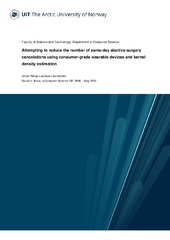Attempting to reduce the number of same-day elective-surgery cancelations using consumer-grade wearable devices and kernel density estimation
Forfatter
Jernsletten, Johan-Niillas LudviksenSammendrag
As people live longer and have increasingly sedentary and unhealthy lifestyles the pressure on the healthcare sector will be increasing in the future. To cope with this increased demand, technological solutions are being tested and implemented with the aim of offsetting some of the added workload. One of these new technological solutions is the use of consumer-grade wearable devices and machine learning to create sickness prediction models which can detect sickness, even ahead of symptom onset or in asymptomatic cases. Prior studies have shown that this combination can detect different sicknesses including COVID-19, Malaria, H1N1 and Rhinovirus. At the same time, studies have shown that several elective surgery cancellations are done on the day of surgery due to the patient being too sick to undergo the procedure, leaving the surgery room, equipment and staff underutilized. In this thesis I therefore implement a prototype alert system using a sickness prediction model based on kernel density estimation and data from a wearable device to predict sickness ahead of time. When testing the model on a publicly available dataset collected using wearable devices, the model was able to detect most sick users but struggled with a large rate of false positives, leading to an investigation of the causes and recommendations for future models.
Forlag
UiT The Arctic University of NorwayMetadata
Vis full innførselSamlinger
Copyright 2025 The Author(s)


 English
English norsk
norsk
